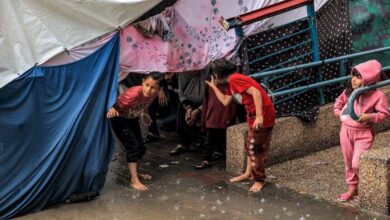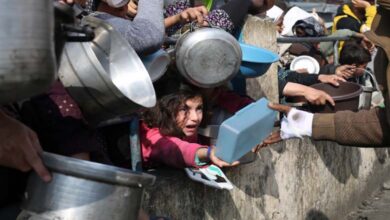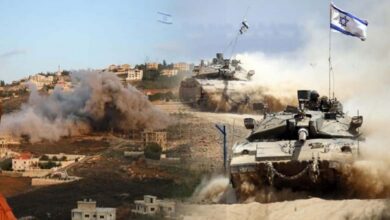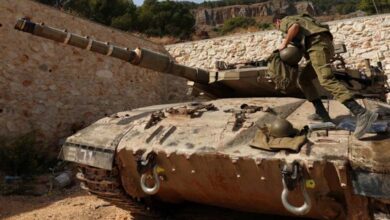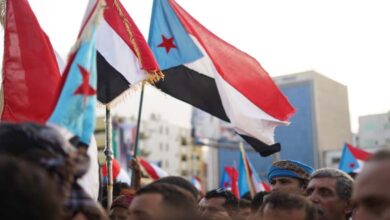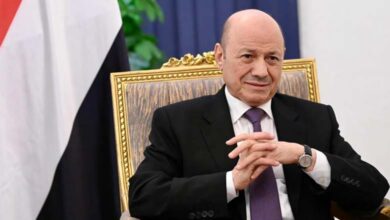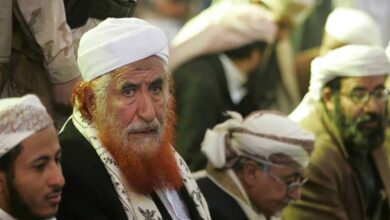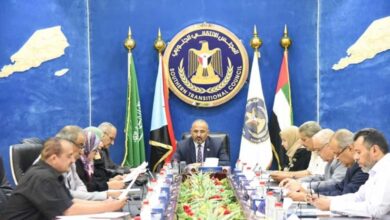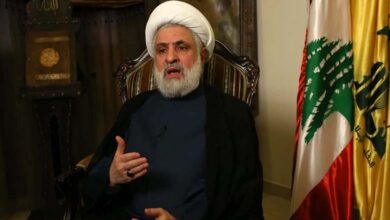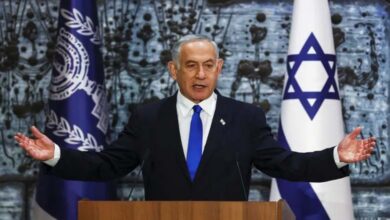Hezbollah and the Death of Nasrallah… the End of an Era?
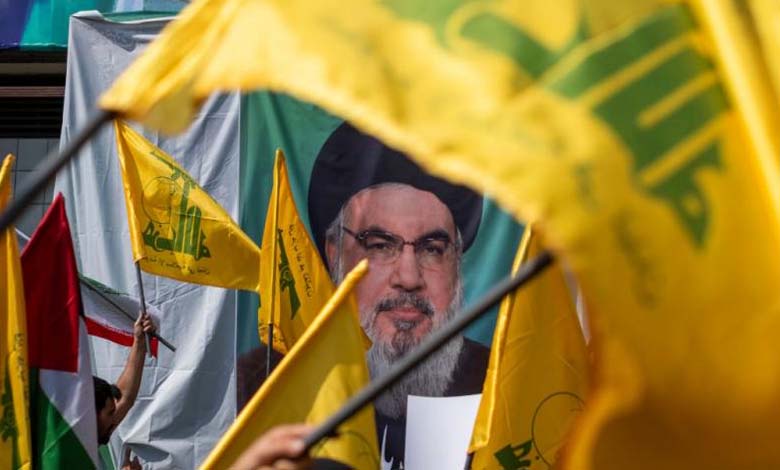
His supporters surrounded him with an aura of “sacredness,” which may explain why his death represents a sharp turning point in the trajectory of Hezbollah, with some analysts considering it a “end of an era” in its history.
-
Sources: Hezbollah’s Deputy Secretary-General Flees Lebanon for Iran after Nasrallah Assassination
-
Hezbollah relies on new leadership whose members are unknown to Israel
With the death of the party’s leader, Hassan Nasrallah, in an Israeli strike in the heart of Beirut, the group, due to the weakening of its capabilities, is now facing a new confrontation regarding its military arsenal and political role in the upcoming phase.
Although the areas that constitute the stronghold and support base of the party are subjected to daily, intense, and devastating Israeli bombardments, Hezbollah remains capable of retaliating by striking deep into Israel, while simultaneously delegating to its Shiite ally Nabih Berri, the speaker of the Parliament, the negotiation for a ceasefire.
-
“New Phase”: Hezbollah Announces Escalation of Clashes with Israel
-
“Target Tel Aviv”: Hezbollah’s New “Qader 2” Ballistic Missile
For a year, Hezbollah exchanged shelling with Israel along the Lebanese border, as part of a “support front” for its ally, Hamas, in the Gaza Strip.
However, the escalation has transformed into an open confrontation over the past month, with Israel targeting key leaders of the party, including Secretary-General Hassan Nasrallah, intensifying airstrikes on its strongholds and conducting ground incursions into southern Lebanon.
“End of an Era”
-
Iran Faces a Dilemma… Who Will Be the Successor to Hezbollah?
-
Maher Al-Assad Abandons Hezbollah to Avoid Israeli Strikes
Sam Heller, a researcher at the “Century” foundation, tells Agence France-Presse that Nasrallah‘s death “represents the end of an era, as he had a significant personal charisma as a leader and was the primary decision-maker in the party,” in addition to the status he built “in Lebanon and the region.”
He adds: “It is certain that the loss of Nasrallah after decades of leading the party will mark a shift” in the party’s trajectory.
Nasrallah was killed in a series of violent airstrikes on September 27 on the southern suburbs of Beirut. Since taking the helm of the party in 1992, he has been at the forefront of the fight against Israel, facing multiple battles.
-
Finances under fire: Hezbollah faces financial crisis
-
Hezbollah Prepares for War of Attrition with New Leadership to Lead the Battle
The confrontation between the two parties escalated dramatically following the explosion of thousands of communication devices used by Hezbollah members in an unprecedented operation attributed to Israel, which resulted in 39 deaths and nearly 3,000 injuries.
This was followed by a targeted strike on a meeting of elite leaders of the party, resulting in the deaths of at least 16 of them, including the commander of the “al-Ridwan Force,” Ibrahim Aqil.
On the 23rd of the same month, Israel intensified its strikes on the southern suburbs of Beirut as well as in the south and east of Lebanon, where Hezbollah maintains a marked presence and influence, causing massive destruction and reducing buildings to rubble.
-
One of them was a missile system commander… Israel kills Hezbollah leaders
-
Hezbollah Foils Israeli Ground Incursion Attempts
Since then, the Lebanese have been living under the rhythm of Israeli evacuation alerts preceding new strikes, holding their breath at the sight of massive flames illuminating the dark suburbs of the capital and resonating beyond Beirut.
Israeli strikes have resulted in the deaths of at least 1,580 people in nearly a month.
The Israeli army claims to have destroyed infrastructures, financial institutions, and Hezbollah‘s weapons depots and factories.
Taking Advantage of the Terrain
-
Disengagement from Gaza: Did Hezbollah accept in private what it publicly rejected?
-
Targeted by Hezbollah: What Do We Know About the Israeli Galilout Base?
After Nasrallah‘s death, the party’s Shura Council did not elect a successor. The party confirmed on Wednesday the death of the head of its Executive Council, Hashem Safi al-Din, who was a potential candidate to succeed Nasrallah, during Israeli strikes.
A collective leadership is managing the party, as announced by deputy secretary-general Naim Qassem, while Lebanese officials, including Prime Minister Najib Mikati, claim communications have been cut off with the party for weeks.
However, Qassem stated that “the big brother” Nabih Berri speaks on behalf of the party, and media reports in Lebanon have indicated that Berri recently accepted a ceasefire in Lebanon, although Hezbollah has so far conditioned any ceasefire with Israel on a similar ceasefire in the Gaza Strip.
-
Will Iran Abandon Hezbollah for Its Regional Interests?
-
Hezbollah and Revolutionary Guard Experts under Houthi Suspicion: New Arrangements in Yemen
Despite clear signs that the devastating Israeli war has weakened Hezbollah, party fighters launch dozens of rockets daily at Israel, some reaching Haifa and the suburbs of Tel Aviv.
The party has also claimed the launch of a drone targeting Israeli Prime Minister Benjamin Netanyahu‘s residence in Qesariya.
Hezbollah asserts that its capabilities are “in good condition” and that the Israeli army “has not succeeded in establishing complete control” over any of the Lebanese border localities.
-
Caesarea under Fire: Hezbollah Rockets Near Netanyahu’s Home
-
Hezbollah Engages in Violent Clashes with Israeli Army near Border
A party ally, well-informed of the developments on the ground, told Agence France-Presse: “Israeli forces have not yet succeeded in stabilizing in any of the sectors they have reached,” as they “face very strong resistance and are forced to retreat under the weight of Hezbollah‘s strikes,” knowing that “the maximum depth they have reached is estimated at about two kilometers.”
Hezbollah fighters benefit, according to the source, from their in-depth knowledge of the villages in which they fight, as well as their knowledge “of their trees and rocks to hide and protect themselves from” Israeli fires.
-
The Role of Hashem Safi al-Din in Hezbollah: Is He Considered the Second in Command After Nasrallah?
-
The Sole Survivor of Hezbollah’s Leadership: Who Is Abou Ali Reza?
“Political Marginalization”
The weakening of the party, which has long held political power in Lebanon, has paved the way for a wave of criticism from its opponents, who believe it has dragged Lebanon into a war that a large segment of the Lebanese population wishes to avoid.
Computer engineer Eli Jabbour (27) says: “The war cannot end as long as Hezbollah‘s weapons are not neutralized,” adding: “When that happens, it will be able to engage in state institutions as a political party and nothing more.”
-
A $7 Million Bounty on Its Leader: What Is Hezbollah’s Most Dangerous Unit, “The Shadow Unit”?
-
Hezbollah Faces Two Choices After Nasrallah’s Assassination: Crushing Retaliation or Defeat
Internal and external political forces are pressing for the implementation of international resolutions, including resolutions 1701 and 1559, which stipulate that the state must restore control over all its territory, including southern Lebanon, and limit weapons to those in the hands of the Lebanese army.
They are also calling for the expedited election of a president of the Republic, a post that has been vacant for two years, accusing analysts and officials of Hezbollah of blocking the election of a president, as it has failed to impose its candidate.
-
Gaza Setback and the Success of Israeli Spies: An Analysis of Hezbollah Infiltration
-
Israel Considers Ceasefire with Hezbollah While Continuing Escalation
Hezbollah is the only group in Lebanon that retained its weapons after the end of the civil war (1975-1990), on the pretext of “resistance to Israel,” and possesses a stockpile of weaponry larger than that of the Lebanese army, according to experts.


